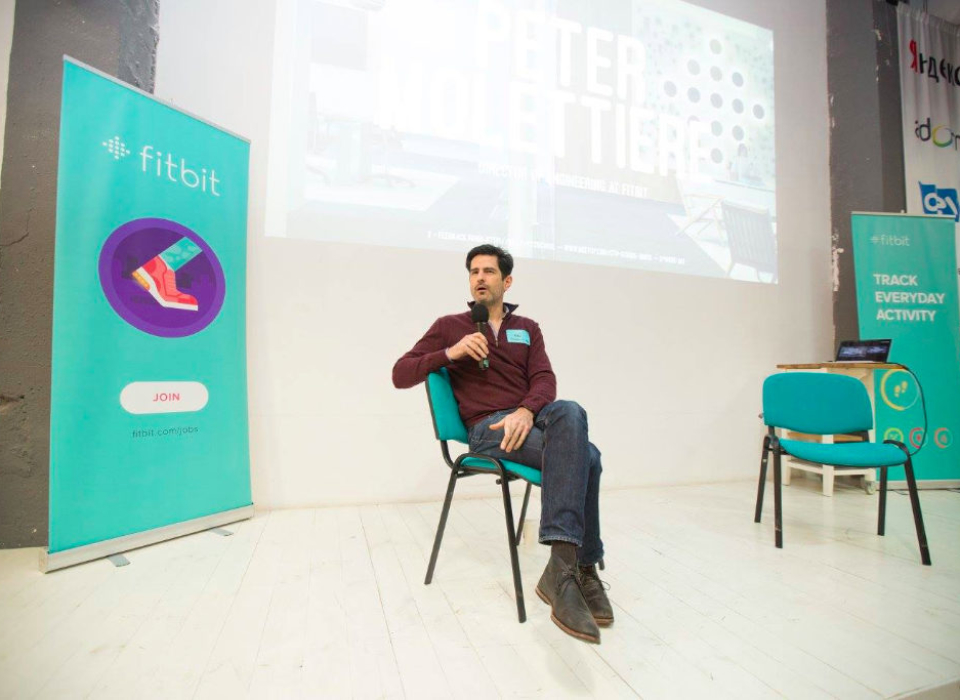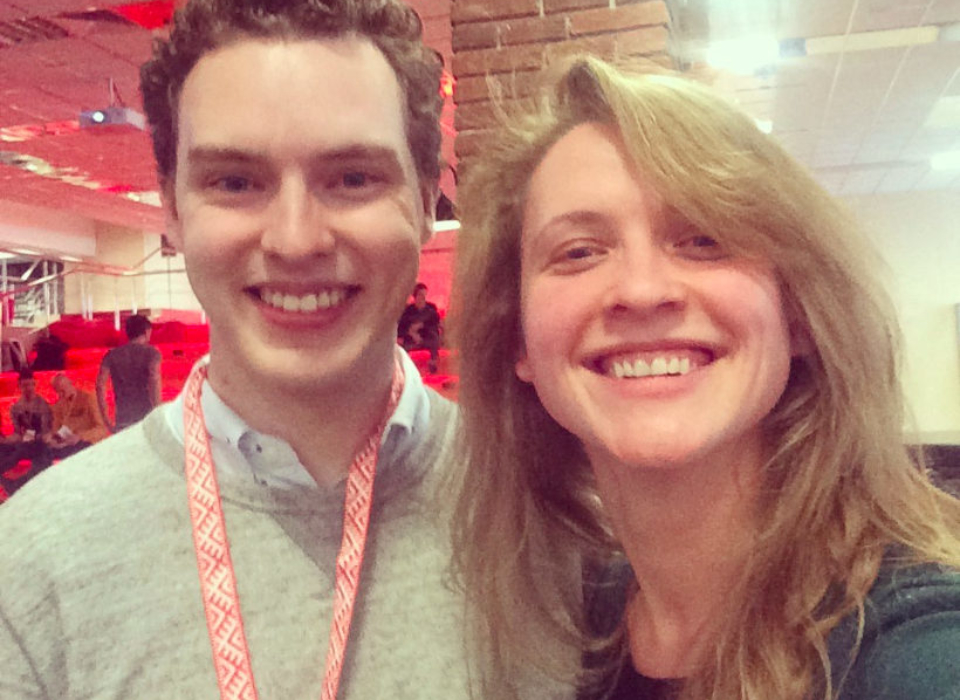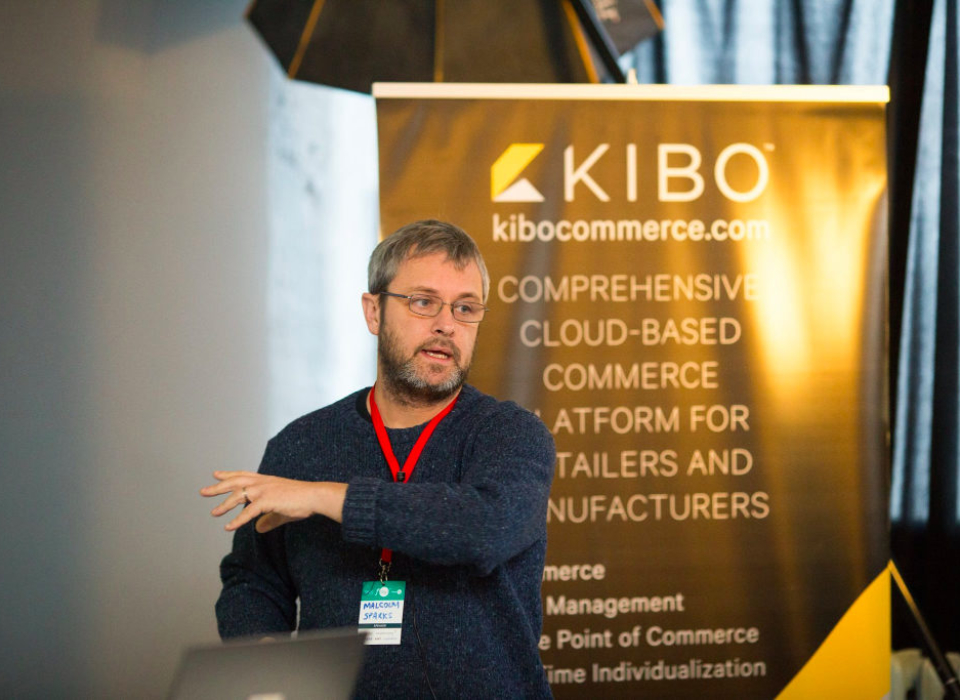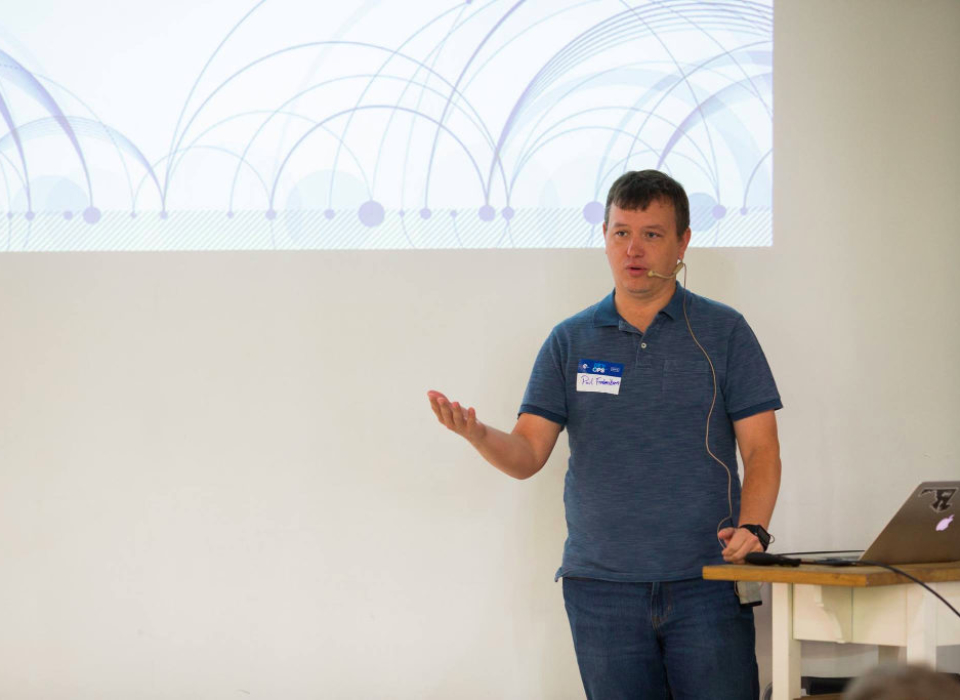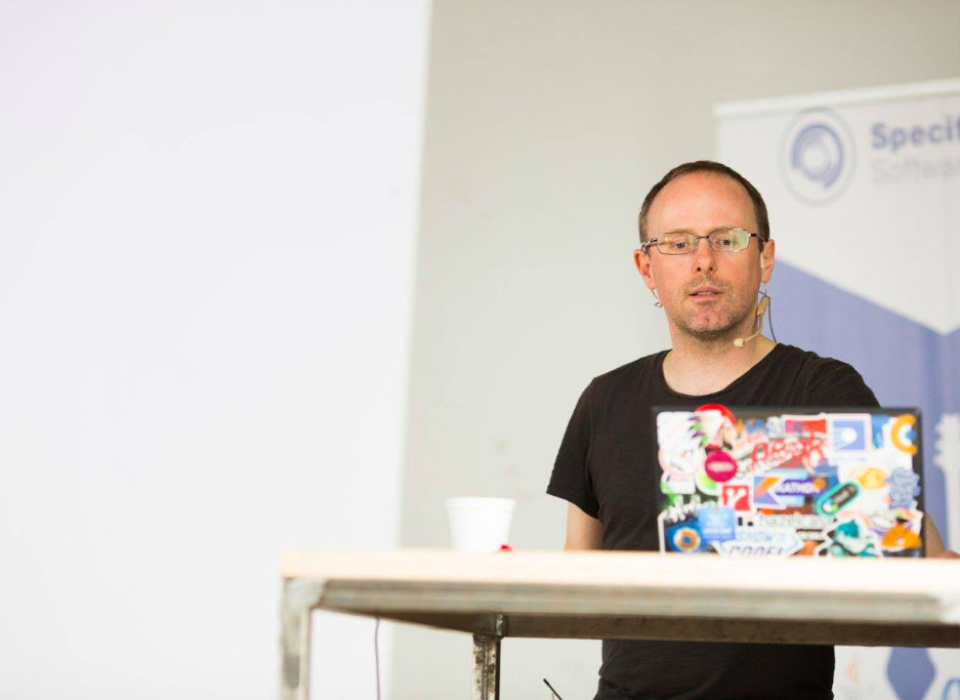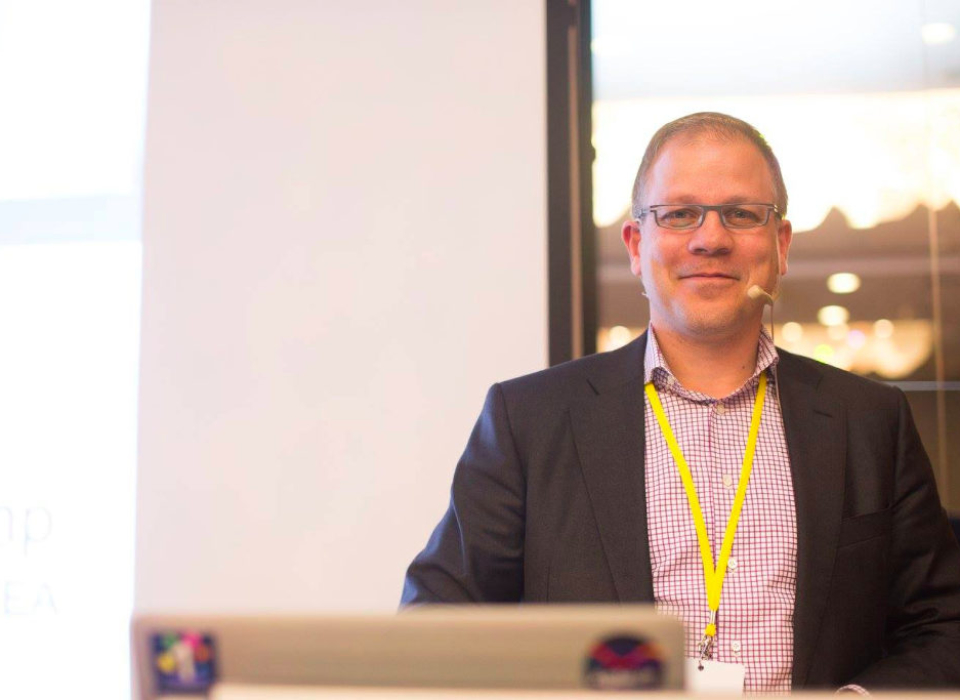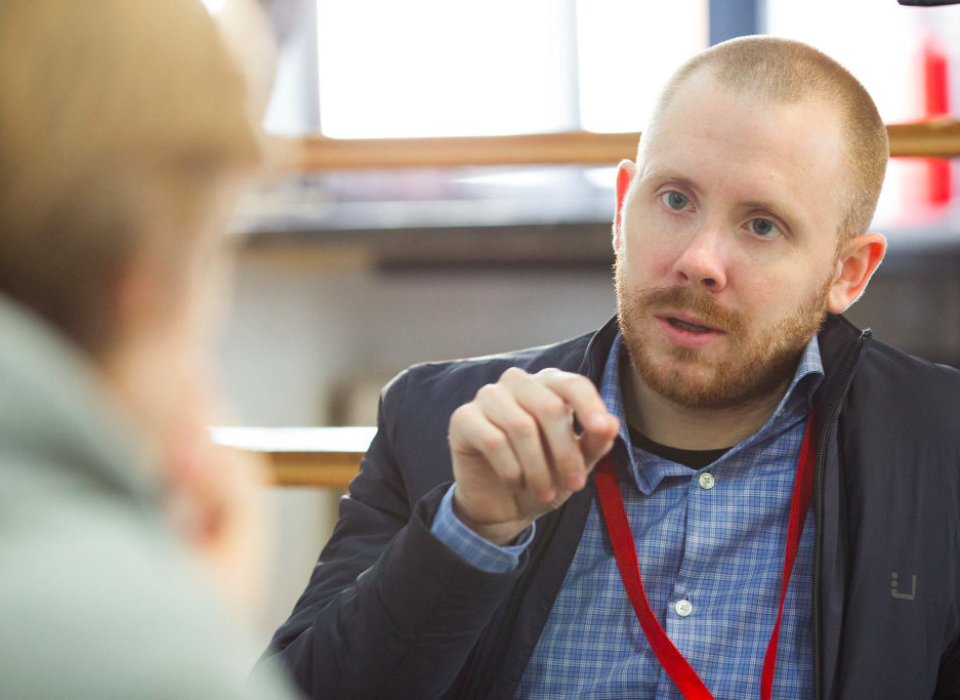It is that very question, that my student asked me once, that made me go and do the whole thing, which took quite a long time: “How much English do i need to communicate in my sphere?” It’s rather difficult to answer it. There’s no time today to spend years learning English, when it’s needed right here right now. I’ve always tried to make English lessons of my students as close to their life/work/interest as possible. That my student who asked the question works in IT and is a usual participant of conferences in this sphere, so i decided to become one of you – Java developer, tester, QA engineer, web-developer, business analyst, well, anyone who represents IT and went out there to see “how much English” you need in order to be able to understand native speakers or become a speaker yourself. I’ve started to visit or watch online some of those conferences/meet-ups/gatherings that are of your interest. I concentrated on the biggest ones which were held in Minsk and involved native speakers. Here’s the result of my “brain-wreaking” experiment:)
To start with, here’s the list of conferences i’ve visited or watched online:
- CTO Fitbit Gathering 2015 (“What it takes to be a director of engineering: cases and life stories”, Peter Molettiere, Director of Engineering, Fitbit, San Francisco, USA)
- Rolling Scopes Conference 2016 (“ES2015 in the browser: beyond the polyfillable”, Seth Thompson, Product Manager, Google Chrome V8 team, San Francisco, USA)
- F(by)2016 (“yada, yada, yada (and some bidi)”, Malcolm Sparks, Director, JUXT, London, UK)
- DevOpsBy 2016 (“ELK: It’s delicious”, Paul Fredriksen, Videology, Maryland, USA)
- Ruby Conference 2016 (“Rodauth: Website Security Through Database Security”, Jeremy Evans, lead developer of the ruby Sequel database library, the Roda web framework, a Ruby Hero in 2015, Sacramento, USA)
- Java Day 2016 (“Java EE revisits design patterns”, Alex Theedom, Co-author of Professional Java EE Design Patterns, London, UK)
- IT Spring 2016 (“Leading the Lean-Agile Software or Systems Enterprise with SAFe®”, Michael Stump, Managing Director – EMEA at Scaled Agile Inc., New York, USA)
- PyCon Belarus 2017 (“Engineering an Open Source Company”, David Cramer, the founder and CEO of Sentry, San Francisco, USA)
| Conference /gathering /meet-up |
Grammar | Vocabulary | Sentence structure/linking words/clauses/ formality | Presentation structure |
| 1. CTO Fitbit
Gathering 2015 (San Francisco, USA) |
– Modal verbs: may, be able to, could have been |
– tremendous – dramatic growth – steady pace – relatively stable – to cohere/kəʊˈhɪə(r)/ – to play on one’s strengths – to foster collaboration – geographically distributed – to focus on – to dig into – to put it on the road map – to meet the need of – to come down to – to be up to sth – pros and cons – to pay off a debt /det/ – to do good – to buy time – to fit the market niche /niːʃ/ – to drive forward – provide a lip service – shuffle the shit – to screw up – to learn from mistakes – to take a shortcut – like a piece of Swiss cheese |
– generally
– that’s not gonna |
– introduces himself (name/company)
– own work experience – mostly Q&A session – uses jokes |
| 2. Rolling Scopes
Conference 2016 (San Francisco, USA) |
– Modal verbs: should/can/might/might have been (modals in the past) |
– to collaborate – to ratify – to signify – to patch up the gaps – to replicate – to reflect – concise /kənˈsaɪs/ – to accomplish – to bundle together – to take advantage – a promise for the future – to give the sense of – to intercept – applicable – to stick to |
– i think, – i hope, – Here’s the example – unfortunately – fundamentally – the 3rd reason why you should … – in particular – but either way – basically – it’s time we … – except for – Assuming i didn’t return… – In conclusion – to be honest
– then you gonna run it through |
– introduces himself/topic: Ok, nice to meet you! – asks questions: how many of you heard of …? – provides examples – provides own experience – ends up with: it’s time for Q&A |
| 3. F(by)2016
(London, UK) |
– Conditional sentences (mostly 1st conditionals): if we look back … / if you want to program one of those devices |
– to address /əˈdres/ – to retrieve information – heavy in my head – to execute /ˈeksɪˌkjuːt/ – to come up with – so beautifully simple – a body premature /ˈpremətʃə(r)/ – all of the same – to pick and mix – to establish – to evolve – via /ˈvaɪə/ /ˈviːə/ – schema /ˈskiːmə/ – adjacent /əˈdʒeɪs(ə)nt/ – data /ˈdeɪtə/ /ˈdɑːtə/ – security constraints – scheme /skiːm/ – credentials – authorization /ˌɔːθəraɪˈzeɪʃ(ə)n/ – to locate the resource – index /ˈɪndeks/ – to migrate /maɪˈɡreɪt/ – to run it in production – mode / de-bug mode / development mode – keen on – query /ˈkwɪəri/ – closure vector |
– mostly simple sentences
|
– introduces himself (name/company) |
| 4. DevOpsBy 2016
(Maryland, USA) |
– Modal verbs: can / don’t have to / be able / may |
– replica shards /ʃɑː(r)d/ – index /ˈɪndeks/ – adjacent /əˈdʒeɪs(ə)nt/ – inputs/outputs – extendable – “quick and dirty” example – custom plug-in – data (piece of data) – generic – pattern – identifier – come up with – human readable – to allow – “easy wins” – look at – independent of each other – to dig deeper – directly – to correlate – fancy |
– uses mostly simple sentences – basically – let’s say you have – as long as – by the way – the problem is – the hardest part is – this is the part where – I’m showing here how log files were sending … – It’s a great way to show you managers – things like that |
– introduces himself/topic |
| 5. Ruby Conference 2016
(Sacramento, USA) |
– Past simple: mostly worked / used |
– maintainable – misconfiguration – impractical – attacker – to access /ˈækses/ – to depend on – vulnerable / vulnerability – iterations – machine /məˈʃiːn/ – up to (500 times faster) – accounts table – to revoke access – to grant access – to execute /ˈeksɪˌkjuːt/ – validity – retrieve – to compromise an account – biometric /ˌbaɪəʊˈmetrɪk/ – Google Chrome /krəʊm/ – ease of use – to deal with – to handle the situation – token /ˈtəʊkən/ – via – index – to enable – to verify – to allow – configuration methods – module /ˈmɒdjuːl/ – either /ˈaɪðə(r)/ – to authenticate /ɔːˈθentɪkeɪt/ – benefits outweigh the costs |
– one of the disadvantages – first, second, finally – as i mentioned earlier – in order to … – whether they use – let’s look … – that’s another reason to use – is critical from security prospective – otherwise – because – as most computers – … is not the whole story – as you can see here – can have dramatic effect on … – for the purpose of this presentation i… – now the important part here – does not / can not (full forms) – … is to have users register their mobile phone number – now, another factor |
– introduces topic |
| 6. Java Day 2016
(London, UK) |
– Present Perfect: who has purchased the book? / how that has helped us / has changed the way we implement
– Past Simple: originated (talking about past) – Present simple: creates a singleton – Modal verbs: can / you don’t have to bother / we might want / you should be able – Degrees of comparison: can make things worse /how much simpler this is / more sophisticated – Passive: is called before any client request / label method is executed / is picked up by any other method – Conditional sentences: if you use …, you will see / if you don’t need it, don’t use it |
– framework – to implement – to allow – causes more problems than it solves – to have a look at – to get rid of – a whole lot of ugly and unnatural feeling code – to convey – to annotate – to inject / injectable – to instantiate /ɪnˈstænʃieɪt/ / instantiation – dependent on – to rely on – immense amount – concurrency – to execute – desirable – to cause – to decouple – to disambiguate /ˌdɪsæmˈbɪɡjuˌeɪt/ – boilerplate code – robust – to far (we’re farring) – lightweight – whatsoever – very well indeed – focus on getting things done – to enhance – to be familiar with |
– a lot of which/who/where/that – sentences – it is very much the case if the only tool you have is a hammer than you will see every single problem as a nail
– i’m gonna try / gonna look
|
– starts with questions: How’s everyone? Had good lunch? Feeling sleepy? – introduces himself (who am i?) – twitter contact given – introduces his book – introduces the topic: what is the talk about – asks questions: hands up who are currently using Enterprise edition? – ok? (repeated lots of time) – makes clear comparison: what’s good/bad/ugly – provides examples to support ideas – provides final conclusions – ends up with: thank you very much for listening to my presentation – Q&A |
| 7. IT Spring 2016
(New York, USA) |
– Modal verbs: have to / – Asking questions
|
– it’s kind of drag and drop – to scale – to result in late delivery – to embrace – to decouple – to focus on – lean – pillar – relentless improvement – to reduce – to be worthwhile – variability /ˌveəriəˈbɪlɪtɪ/ – to break down – to deploy to production – to get the feeling – gain knowledge – to look forward to |
– The main reason is that – typically, … – when/which clauses – what i want to give you on the way, … – I hope, it was … – yeah, makes sense |
– starts with: everybody’s tired already … / i congratulate you for being here – the topic was introduced: what the talk is about (was introduced by someone) – provides own experience – asks questions (a lot) – visual example with a newspaper – ends up with: “have fun” |
| 8. PyCon Belarus 2017
(San Francisco, USA) |
– Conditional sentences: if you’ve ever maintained …, |
– humble beginning – instantaneously /ˌɪnstənˈteɪniəsli/ – expertise – to take ownership of – versus /ˈvɜː(r)səs/ – to contribute to – dilemma /dɪˈlemə/ /daɪˈlemə/ – bootstrap project – to scale – highly competitive – to accelerate /əkˈseləreɪt/ – to maintain a foothold – infrastructure – to allow – to deal with – everything under the sun – to overgrow in a heartbeat – to pay off |
– i think, … – to give you an idea how things changed – however, … – Chris, who is a designer, – arguably – unquestionably – basically – which, you know – and i’ll give you an idea, l – actually – the only reason we got were we are, is …
|
– introduces himself – asks questions: does everybody know …? – describes personal experience – feel free to ask me … – ends up with: that’s kind of it, so i’d love to take questions, and you can also ask me afterwards if you’re afraid of talking in front of people |
The table is rather long to read it fully, i know. So i’ll simply outline the result:
– no one uses sophisticated grammar forms or vocabulary items;
– if you have a quick look through the table, you will notice, that grammar structures are mostly the same: Present Simple, Present Continuous, Past Simple, Present Perfect (rare), Degrees of Comparison, Conditional sentences, Passive, Modal verbs, Questions, Gerund/Infinitive, There is/are, etc.;
– vocabulary – yes, specific, more Business English-like, rather than general one;
– talking about sentence structure: both simple and complex sentences (when, which, that, who – clauses);
– presentation structure – nothing surprising – more friendly, informal, rather than formal, however mostly following a general pattern;
– i didn’t transcript every word, so for sure, there were some other structures, but used once/twice didn’t get my attention:)
This way, it doesn’t make sense going into “Future Perfect Continuous” or “Unreal Past” without making sure you know how to talk about your experience with this or that super modern technology or method in the past, use if-structures when coming up with some real/unreal situations and make comparisons. This is when you’re going to be that very appealing speaker)
Resources used:
- https://www.facebook.com/pg/CTOschoolby/photos
- https://www.facebook.com/eventspace.by
- https://www.youtube.com/channel/UCX5g8IOR_tw1OkiFAzAZHaA/playlists
- http://fby.by/en/
- http://rubyconference.by/2016/
- http://javaday.by
- https://events.dev.by/it-spring-2016-mezhdunarodnaya-konferentsiya-ob-agile-v-upravlenii-i-razrabotke
- http://by.pycon.org

